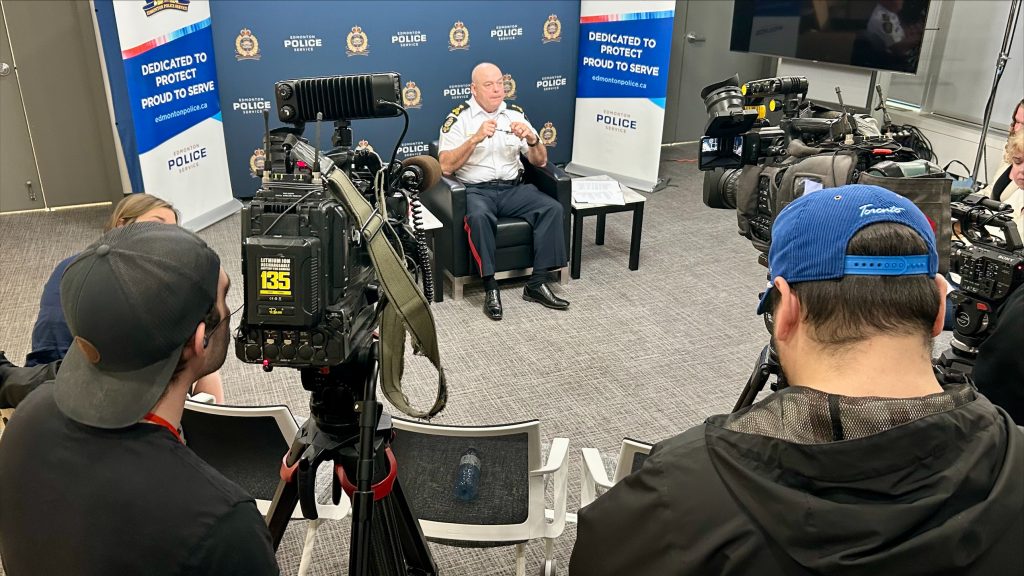Edmonton’s police chief is backing the Edmonton police commission, following its highly unusual decision to decline an invitation to Tuesday’s Edmonton city council meeting.
“We have a very good police commission. It’s not a rubber stamp,” said Edmonton police Chief Dale McFee.
“We don’t get our legitimacy or transparency from council. We’re responsible to the public.”
Councillors wanted to discuss making more information publicly available regarding audits of police budgets, the city’s largest expense.
Instead, council received a letter respectfully declining the request. In it, the commission defended its auditing process and insisted it was within its rights to withhold details of an audit plan. Council voted to reject the letter — a move that is also very rare.
“I might like a little more information, as a councillor,” said Jo-Anne Wright, City councillor and police commissioner.
Wright hopes the relationship can be rebuilt.
“I hope it’s not due to a power struggle or a control issue. I think we all just need to have a better understanding of each other’s roles.”
McFee suggested council needs to stay in its jurisdictional lane, explaining that while elected councillors set the budget, appointed commissioners decide how to spend the money.
“What’s the role in council, having them see an audit of our weapons, and then sending misinformation out, if that’s what happens? Because it’s not like that hasn’t happened before,” said McFee.
The chief also confirmed that a commission meeting next week will again be held virtually, in part because some commissioners don’t feel safe meeting in public.
“We can make anything safe with the right planning. But the question is, do people feel safe?” asked McFee.
McFee repeatedly insisted he’s not sure why some councillors are upset with the commission or what information they need, but he acknowledged the police will never make everyone happy.
“Regardless of what somebody tweets, regardless of what a politician puts out in the public, they call us names, we’re going to show up because we show up for the citizens of Edmonton.

Late Thursday, the police commission announced they’ve requested a meeting with council and an independent, third-party facilitator to improve the relationship for the benefit of Edmontonians.
“The Edmonton Police Commission understands and appreciates the ongoing discussion about police governance and accountability, and we are committed to ensuring Edmontonians have the information and responsiveness required to ensure effective policing across the city,” said the police commission in a statement.
The commission added effective governance requires all partners within the governance framework to respect the unique role each other plays, and that political decision-making is kept away from policing.
Adding it is responsible for providing civilian oversight of the Edmonton Police Service per the Police Act.
“Edmonton City Council is a valued stakeholder for the Commission as they hold a vital role in establishing a budget for policing that ensures the right amount of police officers are providing safety and services to Edmontonians. This Commission understands Council’s role for establishing the fiscal framework for policing and we are seeking to work collaboratively in this space. Edmonton needs our relationship to be collaborative and constructive,” said the police commission in a statement.
“The EPS budget, just like those of other City departments, is included in the City of Edmonton’s consolidated financial statements and already subject to an independent, external audit co-ordinated by the City on an annual basis. The Commission stands by the decision to preserve our internal audit function as it is currently structured, because audit material and topics outside of fiscal matters are solely the responsibility of the Commission. Our audit program is focused on internal risks to the organization, which is not something that would be shared publicly or with Council. Council does not have operational oversight of the police service and is unable to direct any operational recommendations that may result from any audit process. Therefore, the focus of any audit requested by Council should remain on its own areas of authority, which are limited to the finances of the police service.
“The Commission recognizes that Council is looking for additional levels of input and we have endeavoured to forge a working relationship with all councillors through monthly meetings with the Mayor, informal luncheons with council, individual meetings with councillors, responses to individual inquires, and working with councillor appointees to ensure Council as a whole understands policing legislation, policies and processes, as well as to ensure we each support our respective roles and the effectiveness of policing as a whole.”